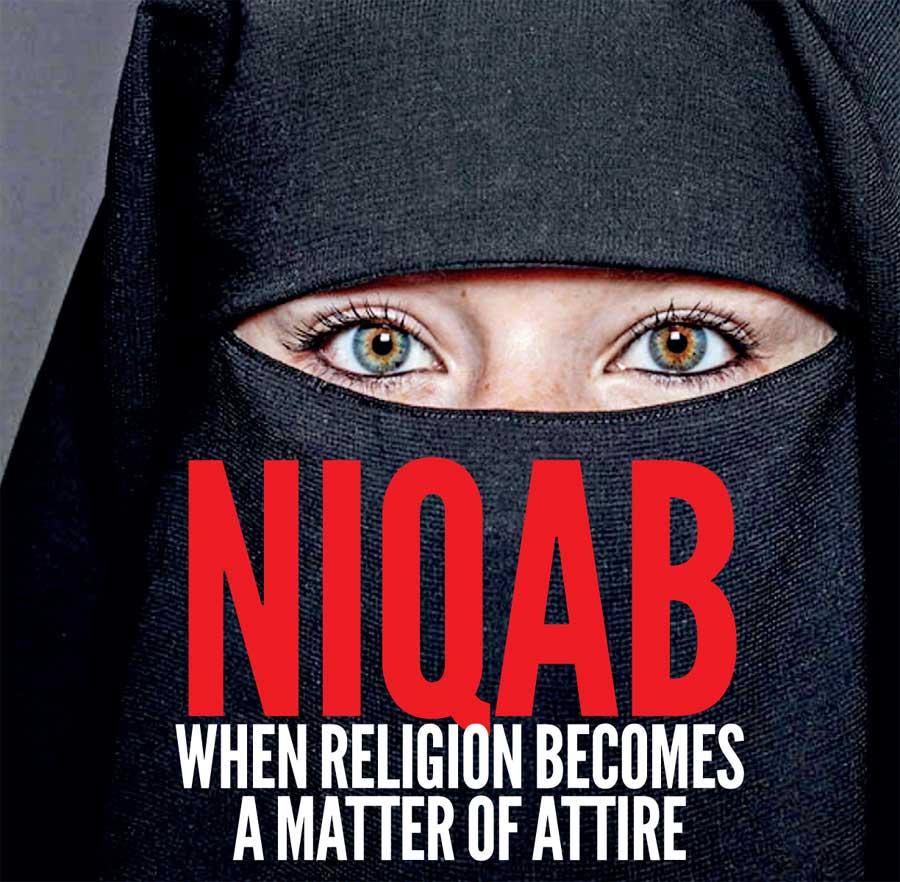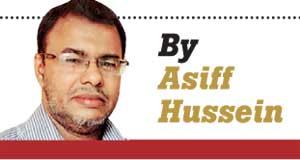Reply To:
Name - Reply Comment

Reappearance of the Niqab still pose a security threat?
ACJU also supports restriction on Niqab cladding
Niqab ought to be a matter of choice
Qur’an presupposes a society where women are not necessarily veiled
There has perhaps been no garment that has aroused so much controversy as the Niqab or face-veil worn by a small minority of Muslim women. Although worn by only a very small percentage of women, it is conspicuous as can be and grabs attention wherever it is worn, making one wonder whether it is really for modesty as it is made out to be, or for attention.
Jokes apart, it is bound to come to the limelight again no sooner the state of emergency is lifted. As we know, a ban was imposed on all forms of face coverings that prevented  identification of persons as part of the state of emergency following the Easter Sunday bombings. This was of course a very valid security concern and received the support of the Muslim community. The All Ceylon Jamiyyathul Ulama, the apex body of Islamic scholars in Sri Lanka also supported it and in fact issued a statement requesting women not to wear it.
identification of persons as part of the state of emergency following the Easter Sunday bombings. This was of course a very valid security concern and received the support of the Muslim community. The All Ceylon Jamiyyathul Ulama, the apex body of Islamic scholars in Sri Lanka also supported it and in fact issued a statement requesting women not to wear it.
"Islam prescribes a dress code for both men and women. For men it is the portion extending from the navel to the knees must be covered and for women, it is the entire body except for the face and hands"
However, the question now is will the ban ever outlive its purpose? Would the reappearance of the Niqab still pose a security threat? What are the other implications of the Niqab when it makes its appearance again? These are questions that need serious answers.
My personal feeling is that Niqab ought to be a matter of choice as in other things. However there are some factors that militate against this ideal, which I shall deal with here. But first let us see if the face covering is really obligatory as some extremist scholars claim. In fact, it is the claim that it is obligatory that has been used to foist the Niqab on unsuspecting women. So let’s see how far this claim is true.
There is no doubt that Islam prescribes a dress code for both men and women. For men it is the portion extending from the navel to the knees which is the minimum that must be covered. For women it is the entire body except for the face and hands. Prophet Muhammad made it very clear that every part of a woman should be covered when in the presence of a non-related male save for her face and hands. Ayisha, the Prophet’s wife has narrated that when her sister Asma once came to see him, she was wearing a thin dress. The Prophet turned away from her and said to her: “Oh Asma, once a woman reaches the age of puberty no part of her body should be uncovered except this and this” and he pointed to the face and hands (Abu Dawud).
However, there is nothing wrong in covering more for purposes of modesty and this has been left to the choice of the woman concerned. However, what we are concerned about is whether it is obligatory. A renowned scholar of Islam, Sheikh Nasiruddin Al-Albani undertook a very comprehensive study of this in his treatise Jilbab al-Mar’ah Al-Muslimah (1996). He showed that the covering of the face was not obligatory for ordinary Muslim women and marshalled much evidence to support his contention.
The Qur’an too presupposes a society where women are not necessarily veiled, as in the verses: “Tell the believing men to lower their gaze and be mindful of their chastity. This will be most conducive to their purity. Verily, God is aware of all that they do. And tell the believing women to lower their gaze and to be mindful of their chastity, and not to display their charms (in public) beyond what may be apparent thereof” (Surah An-Nur: 30-31). That the Qur’an should instruct men to lower their gaze when in the presence of strange women itself suggests that it was permissible for women to go about unveiled, for otherwise there would have been no reason for the Qur’an to command thus. It is also reported that when a well known companion of the Prophet, Ibn Abbas was asked about the verse regarding women not displaying their charms except what appears thereof, he replied: “it refers to the face and hands” (Al-Musannaf, Ibn Abi Shaybah, Sunan Al-Kubra, Baihaqi).
"The Qur’an should instruct men to lower their gaze when in the presence of strange women itself suggests that it was permissible for women to go about unveiled"
‘The Noble Qur’an’ by Muhsin Khan and Taqiuddin Hilali has inserted the translators’ personal views on to the text of the translation by inserting brackets. This is apparent in verse31 of Surah An Nur: “And tell the believing women to lower their gaze and protect their private parts (from illegal sexual acts) and not to show off their adornment except only that which is apparent (like palms of hands, or one eye or both eyes for necessity to see the way) and to draw their veils all over (their bodies, faces, necks and bosoms etc)”. Now, this is a very unethical thing to do. If the translators wished to elaborate on the verse in question, they could have easily mentioned it as their personal opinion in a footnote as they have done elsewhere, but here they had surreptitiously inserted it in the body of the text itself so that credulous readers would come to believe that the Qur’an was commanding women to be veiled. This is nothing short of blasphemy, inserting one’s words into the Holy Word of God.
We see a similar pattern even here in Sri Lanka. I was informed by a friend that his young daughter who was teaching at a leading international Muslim girls school in Colombo had, a couple of years ago, fallen victim to a senior female teacher there who had prevailed on her to don the Niqab despite the objections of her father. One finds many such insidious campaigns to promote Niqab going on even as we speak.
Proponents promote Niqab as a means of promoting chastity and preventing the lustful gaze of males and its attendant evils. However this premise is faulty because God clearly tells us in the Qur’an to lower our gaze. So it this divine command that we must follow rather than trying to control our feelings by putting the burden on women. This is in the fitness of things, because this earthly life with its entrapment, as we all know, is a test, and he or she that passes it without falling victim to it is on the right path.
Furthermore, there have been keen observers who have noted that a lot of vices do take place in societies where women are all covered up. This is because of the anonymity it gives. In fact, there are those who call it ‘liberating’ because a woman thus attired could indulge in adulterous affairs in utmost secrecy without her husband as much as suspecting it. Thus one wonders whether it is really such a good idea to ensure chastity?
" There have been keen observers who have noted that a lot of vices do take place in societies where women are all covered up. This is because of the anonymity it gives"
As such, the Niqab as we know it today tends to create an aversion towards its wearers on the part of the majority of our people. One only has to see the notices in the shops and schools screaming away ‘No Niqab, no Burka’ and the look of ordinary people on the streets when they see a woman strutting about with it. It is looked upon not only as being alien, but exclusive as well, creating an aversion such as the Jews of the Middle Ages invited in Europe with their exclusivity and as a result suffered its consequences. As such, one cannot imagine that Islam would have ever made such an attire obligatory. Islam is about winning hearts, not about driving people away from it.